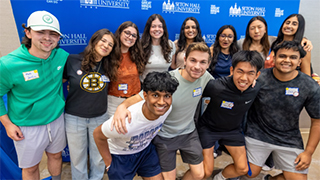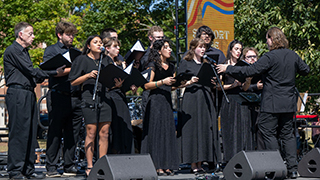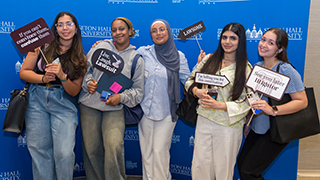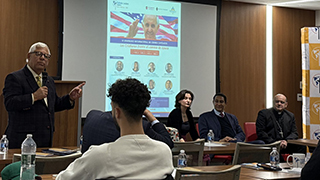Inside the Core: Students Begin the Spring Semester - Seton Hall University
Thursday, January 26, 2023
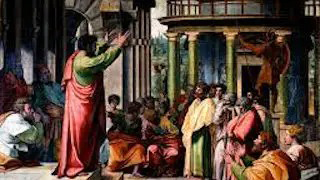
Inside the Core this week, students are in the middle of their first full week of Core I or Core II. The majority of Core sections running are Core II classes, though we are also offering several sections of Core I. In Core II students begin with looking at the early Christian church (in either First Corinthians or First John) and the ancient classical world with Plato’s Crito. Core I students are reading Msgr. Fahy’s Presidential Inaugural Address of 1970 (at Seton Hall University) and moving into Nostra Aetate, the ground-breaking document from Vatican II that spelled out how the Church should dialogue respectfully with people of other faiths.
Each of these texts deals with finding meaning in a complicated world. St. Paul’s first Letter to the Corinthians calls the new believers to task for having divisions and not sharing their meals and goods properly together. His famous chapter on love (First Corinthians 13) immortalizes the nature of love when lived in a real and meaningful way: “Love is patient, love is kind and is not jealous,….” If students read, alternatively, First John, the focus throughout is on love, with the deeply meaningful lines from the fourth chapter explaining the freedom of living a life in God’s love: “There is no fear in love, but perfect love casts out fear.”
Core II students may also begin reading about the pre-Christian classical Greek world of Plato, whose Crito depicts Socrates’ final conversations with his student, Crito, who is desperately trying to persuade his beloved master to flee rather than succumb to execution, which he is awaiting while under sentence of death and house arrest. Socrates makes a memorable argument about how his ethical stance and strong moral code will not allow him to go against his conscience and flee. He chooses to remain and face death and convinces even the grieving Crito that he is right to do so, by the end of the dialogue.
In Core I, students also deal with values and meaning addressed first by Msgr. Thomas Fahy, President of Seton Hall from 1970-1976. In his inaugural address he challenges the academic world (i.e. specifically Seton Hall) to live out his mission and values by making education relevant (since the academic world of that time was being charged with irrelevance). Msgr. Fahy encourages Seton Hall to apply education to the problems of the world, including racism, economic injustice, the war in Vietnam, and ecological damage. It is almost shocking how timely his message is read more than fifty years later.
Finally, Nostra Aetate, also read early in Core I, is a call to the Catholic Church of 1965 to live out the principles of love and acceptance of others, deep in its roots in the teachings and actions of Jesus, but not always lived out by the Church as an institution historically. The Vatican Council fathers were calling on the church to treat others, who were of different faiths, as beloved children of the one God, who share with Christians the search for truth and the desire to live a moral and meaningful life. In a spirit of dialogue, the document urges respect and understanding with those of other faiths.
These texts are all deeply meaningful and challenging in that they assume the readers (or hearers, in Msgr. Fahy’s case) have a desire for both truth and goodness. These first readings come at an especially auspicious time in the spring semester, as we have just celebrated Martin Luther King’s birthday, when we had a series of important presentations about his legacy and its application to the world today. Later in Core I, students will be reading Dr. King’s final “Mountaintop” speech from April 3, 2968. The Core will also be co-sponsoring two events that similarly celebrate the values and legacy of Dr. King, along with others. On Feb. 7 from 9:30- 4, we will have a Peace Symposium, entitled, “Inciting Peace from the Inside Out,” in which the lives of Gandhi, Mother Teresa, Howard Thurman, and Thich Nhat Hanh will be explored in relation to how they used contemplative practice to live out their lives of activism rooted in non-violence. In relation to Dr. King, Thurman and Gandhi were crucial influences on the way he practiced and taught non-violent activism. Click here for the link to Inciting Peace.
Then from March 24 through April 4, Seton Hall will hold for the fourth time Romero-King week, in which we honor the martyrdom of the two great leaders, St. Oscar Romero and Dr. King. March 24, 1980 was the day Romero was assassinated because of his defense of human rights and the poor. April 4, as most Americans know, is the anniversary of the assassination of Dr. King. During the (slightly more than) week, films related to King and Romero will be made available to students and faculty.
All in all, in a world filled with violence, lies, and division, Core I and Core II, as well as the events mentioned, offer us another way to live and questions to ask along the journey.
Categories: Education, Faith and Service


